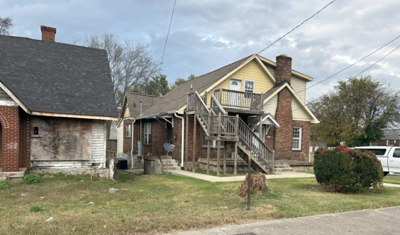Buildings central to the city’s historic struggle against racial discrimination make up this year’s Nashville Nine. Historic Nashville Inc.’s annual list of sites “in danger of being lost to demolition, neglect or development” focuses on the homes of key civil rights figures and businesses that helped provide critical services for the city’s Black residents during segregation.
Five of the buildings are in North Nashville, where the city’s tight home market has driven up land prices. Over the past few years, single-family homes in the city’s historically Black neighborhoods have frequently been replaced with larger homes, sometimes with two or more units. The list also includes the home of Frankie Henry on Maury Street in Napier, another historically Black enclave between the Cumberland River and Lafayette Street. Henry was a civil rights activist burned with a cigarette by a white woman during a downtown sit-in.
Historic Nashville Inc. goes on to list the small brick office of Fred Goldner, a Vanderbilt doctor with an integrated practice who participated in the downtown lunch counter sit-ins, as well as the Adams-Kimball Cemetery, a century-old Black cemetery on private land in Forest Hills with marked and unmarked burial sites. The list's final spot is dedicated to two buildings from previous years — the former homes of civil rights attorney Z. Alexander Looby and physician George Hubbard — that face uncertain futures.
“As we prepare to celebrate the 60th anniversary of the passage of the landmark Civil Rights Act of 1964, which outlawed discrimination based on race, color, gender, national origin or religion, we’re using this occasion to reflect on Nashville’s willingness to preserve the history of the struggle that led to this victory,” reads a statement from the nonprofit preservation group released on Tuesday.
Also included on this year's list are the home of civil rights figure JohnEtta Hayes, the company headquarters of real estate mogul J.W. Frierson, the childhood home of Freedom Riders Joy Reagon and Cordell Hull Reagon, and the R&R Liquors building on Jefferson Street. The statement goes on to name former Nashville Nine sites, like Fort Negley and the Elks Lodge on Jefferson Street, now considered preservation victories. The group builds its list, which it has published each year since 2009, through public nominations, and is governed by a board that includes historian Dr. Learotha Williams Jr. and Scene contributor Betsy Phillips.
Just last week, our own Nicolle S. Praino reported that the historic Morris Memorial Building is under contract with a hotel developer after the city passed on the chance to purchase it. The Morris is the only building left in downtown Nashville originally associated with the Historic Black Business District and was built on land where Black people were once sold into slavery.





